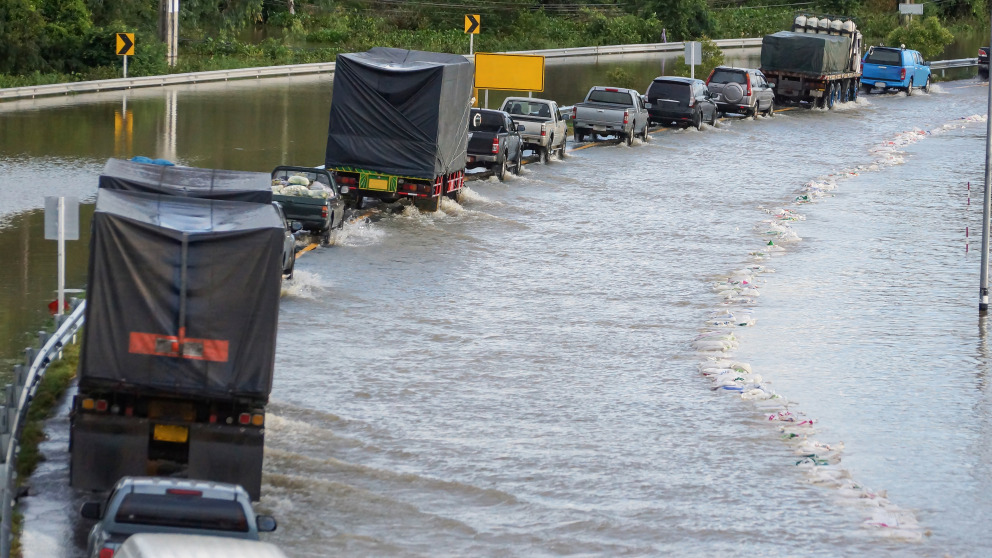Vulnerable supply chains in times of Covid-19 and climate change: A call for a new research agenda
15.03.2022

The Covid-19 pandemic gives us a glimpse of what climate change has in store for us concerning our globalized economic system. The supply-side shocks triggered by the pandemic have caused enduring disruptions of global supply chains. Due to various bottlenecks along global transport routes, freight costs have increased fivefold since the beginning of the pandemic. Higher transport costs and continued difficulties in delivering primary products are an obstacle for industrial production, resulting in rising prices for industrial goods and even for raw materials, including food. The latter especially affects consumers in middle income and developing countries, where these expenditures make up a large proportion of consumption.
The Covid-19 pandemic reveals the lack of resilience in supply chains and the impact that disruptions caused by pandemics but also extreme weather events like the North American winter storm in February 2021 have on a global network of individual supply chain connections. These events give us an impression of the far-reaching effects that climate change will have on the global economy. In fact, supply chain disruptions have already occurred due to extreme weather events. The February 2021 cold snap in the US state of Texas has driven up prices in global plastics production, due to the major role the state plays in this sector. Global food production is also taking a dip due to various extreme weather events such as the heavy rains in China and India and heat waves and long droughts in California and Argentina last year. Another phenomenon are the forest fires in various parts of the world, fuelled by the heat waves. Due to climate change, extreme weather events are likely to increase in frequency and severity over time.
These examples demonstrate the systemic nature of risks associated with pandemics, climate change and global supply chains. Systemic risks are complex, interconnected and transboundary. For instance, the rapid and drastic countermeasures adopted in China in the wake of Covid-19 led to international bottlenecks in the supply of medicines. Together with India, China is the main producer of active pharmaceutical ingredients. The pharmaceutical industry especially, but also other industrial sectors such as the automobile and consumer electronics industry, are geared towards just-in-time production with minimal buffer capacity that makes these industries highly susceptible to disruptions in supply chain networks.
These developments point toward new challenges for the future global economy. On the one hand, they illustrate the economic advantages of an ambitious climate protection policy: the earlier greenhouse gas emissions are reduced, the smaller the negative economic impacts of climate change on the economy in the long run. On the other hand, they also show that climate adaptation policy requires additional research into the systemic interdependencies of climate change and climate adaptation policies as well as their impacts on society and the environment.
For instance, we need a more comprehensive understanding of climate change impacts. Along with assessing the macroeconomic effects of climate change, the discussion has so far focused on its direct effects on ecosystems, agriculture and infrastructure. Accordingly, adaptation measures are primarily geared toward protecting against these direct physical consequences of climate change. For example, the planning and development of physical infrastructure should ensure increased resilience against extreme weather events. While this remains a critical aspect of climate change adaptation, there is a need to pay greater attention to systemic risks, including the countervailing transition risks to which the low-carbon transition is likely to give rise. There is a growing research agenda on such transition risks, especially on those arising from the devaluation of assets due to climate policy measures (or so called stranded assets). However, the various categories of transition risk (e.g. economic, environmental, social, and political) are generally analysed independently from each other. This raises the danger that important systemic interconnections, which may give rise to so-called risk cascades are overlooked.
The debate on the impacts of climate change on the global trading system and the vulnerabilities arising from transnational economic interdependencies and ensuing systemic risks is still in its infancy. Going forward, we need not only new analysis and insights to help us better understand these complex interconnections, but also tools for translating such insights into instruments to support decision-making in both the public and private sector. We are confronted with the question of what strategies could strengthen the resilience of global supply chains without neglecting the advantages of an international division of labour. While greater diversification and a degree of redundancy may be costly, it may be necessary to ensure the resilience of global supply chains. The key challenge is to devise cost-effective strategies for building resilient network structures in which interconnected but not one-sidedly dependent actors guarantee the stability of the overall system. In addition, systems for the early detection and management or prevention of systemic risks should be established.
This article was first published by Nature and is partially based on material published in the following German-language article. Quitzow, R. (2022) Die Pandemie als Augenöffner in der Klimakrise, Internationale Politik, Januar 2022.

